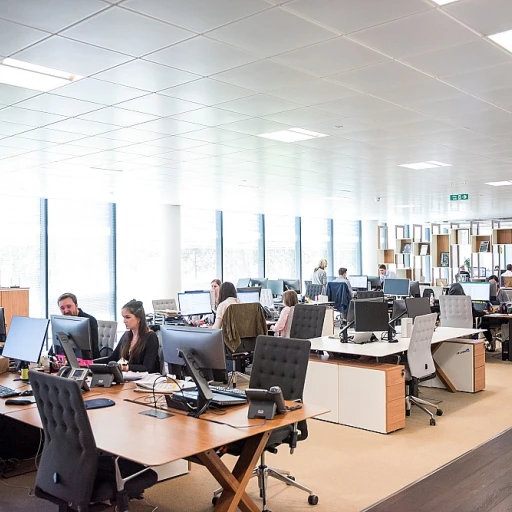
The Purpose of Pre-Screening Interviews
Pre-Screening Interviews as a Vital Step
Pre-screening interviews mark an essential phase in the hiring process, helping companies identify the most qualified candidates for a job. Before diving deeper into the interview process, it's crucial to evaluate if a candidate could potentially be a good fit for the role and the company's work environment. Hiring managers often use these interviews to assess a candidate's basic skills and experience, and to determine if they align with the company's cultural fit. By doing so, employers save valuable time and resources by only inviting those candidates to continue who match the relevant job criteria. Some common elements include asking screening questions that delve into a candidate's past work experience, interview questions that explore the applicant's skills, and open-ended queries about what they are looking for in a position. These can range from inquiries about previous roles to understanding salary expectations which help ensure a fit with the company's salary range. Additionally, these interviews allow candidates to express their interest in the role and to learn more about the company's culture and values. Therefore, this step isn't just beneficial to the employer, but also provides the candidate with insight into whether they see themselves thriving in the prospective work environment. Moreover, understanding the dynamics of compensation packages can significantly influence candidates' decisions, though this topic is often reserved for later stages of the hiring process (for more on compensation packages, check out this informative post). Ultimately, investing in the pre-screening interview process can streamline hiring efforts by focusing on engaging only the best candidates who, not only meet essential technical requirements but who are also in line with the company's ethos.Key Elements of a Pre-Screening Interview
The Core Components of Effective Pre-Screening
Pre-screening interviews play a vital role in the hiring process by providing a strategic method to sift through a large pool of candidates. As a company, understanding what constitutes an effective pre-screening will streamline this initial stage of selection.Crucial Aspects to Consider
An effective pre-screening interview thrives on a few fundamental elements:- Screening Questions: Asking targeted questions is the backbone of any pre-screening interview. These questions help gauge a candidate’s basic qualifications, work experience, and salary expectations to ascertain their compatibility with the position.
- Cultural Fit: Assessing the cultural fit isn't just about job skills—it's about aligning with the company culture and work environment. This ensures that the candidate will not only perform well but also integrate smoothly into the team.
- Skill Validation: It's imperative to evaluate whether a candidate's skills align with the needs of the role they are applying for. Identifying a good fit early in the process saves time and resources.
Evaluating the Best Candidates
Finding the best candidates involves a systematic understanding of their professional background and potential contribution to the company. The interviewing process should be designed to extract relevant information about a candidate's capabilities and how they might fit in with the company's long-term goals. For more in-depth strategies on overcoming these challenges and becoming a culture champion in your hiring process, you can explore how to effectively navigate HR data challenges here. This resource delves into adopting best practices that support effective decision-making. Navigating these elements effectively allows hiring managers to make informed decisions swiftly, ensuring that the most qualified candidates proceed further in the hiring journey.Benefits for Employers and Candidates
Advantages for Both Parties in the Hiring Process
When diving into the intricate process of a pre-screening interview, it becomes evident that there are substantial benefits for both employers and candidates alike. Understanding these benefits can optimize your experience, whether you're seeking talent for a position or on the hunt for your dream job.For employers, pre-screening interviews serve as a valuable filtering process. This stage can help hiring managers determine if candidates have the basic qualifications required for the role. Questions help in assessing whether the candidate possesses the necessary skills and experience and if they would be a good fit for the company's work environment.
- Time Efficiency: Pre-screening interviews save time by narrowing down the pool of candidates early in the hiring process.
- Cost Reduction: By identifying qualified candidates sooner, companies reduce the resources spent on prolonged hiring phases.
- Cultural Fit Assessment: Screening questions can offer insights on how well a candidate aligns with the company culture.
From the candidate's perspective, this stage offers the opportunity to learn more about the company and the role they are applying for. It also helps ensure that their salary expectations align with the company's salary range. A pre-screening interview can foster a better understanding of what the job entails and how they might fit into the role.
- Expectation Management: Candidates have the opportunity to clarify questions about the hiring process, the position, and salary range.
- Self-Reflection: Provides a platform to evaluate their own experiences and skills against what the company is seeking.
- Reduced Anxiety: With more knowledge about company culture and team dynamics, candidates can face interviews with greater confidence.
Overall, the pre-screening interview is a crucial step, bridging gaps between candidates and companies. More insights on optimizing this part of the process can be found in the comprehensive guide on navigating the pre-screening process.
Common Challenges in Pre-Screening Interviews
Overcoming Hurdles in Pre-Screening Interviews
Pre-screening interviews are a pivotal part of the hiring process, yet they can be fraught with various challenges. Identifying these challenges and finding ways to address them can improve the overall efficiency of the hiring process for both employers and candidates.One of the primary challenges is the lack of clarity in the interview questions. Without clear and focused screening questions, interviews can become ineffective, leaving hiring managers without the necessary insights to evaluate a candidate’s fit for the position. Having standardized and specific questions helps ensure that all applicants are assessed on similar criteria, potentially enhancing the identification of the best candidates.
Time constraints also pose a significant challenge during pre-screening interviews. Given that hiring managers are often under pressure to fill roles swiftly, there might be a tendency to rush through this critical phase. However, allocating the appropriate amount of time allows for a thorough examination of a candidate’s skills and experience, helping to ascertain their suitability for the job and cultural fit within the company.
Additionally, ensuring a consistent and standardized process can be difficult. Variability in the interview process across different candidates may lead to inconsistencies that skew the hiring outcomes. A uniform approach, possibly supported by technology, helps overcome any biases, ensuring that all applicants are evaluated impartially, based on merit and qualifications.
Communication barriers can also impede the screening interview process. Misunderstandings related to salary expectations, job responsibilities, and work environment should be clarified during these early stages to avoid any discrepancies later on. Adequate communication helps in setting realistic expectations for both the candidate and the company, aiding in the selection of candidates who are a good fit for the role.
Best Practices for Conducting Pre-Screening Interviews
Guidelines to Optimize the Screening Interview Process
The screening interview serves as a critical checkpoint in the hiring process, allowing companies to filter candidates who might be a good fit for the job. Here are some best practices to ensure an effective pre-screening process:- Develop a Structured Interview Process: A well-structured screening process is crucial in maintaining consistency. Prepare a set of interview questions that align with the job requirements, focusing on skills, experience, and cultural fit. This approach helps in evaluating candidates fairly and comparing their responses effectively.
- Prioritize Key Job Criteria: Understand the essential job criteria before conducting interviews. Focusing on the core competencies, skills, and experience required for the role will help in identifying the best candidates. This not only speeds up the selection process but also ensures that the candidates align with the company's needs.
- Evaluate Communication Skills: Communication is key to any role, especially if the position involves collaboration. Assessing candidates’ communication abilities during the screening interview can provide insights into how they will fit into the work environment.
- Establish Clear Candidate Expectations: Clarifying salary expectations and the company's offerings during the screening process can eliminate potential discrepancies later in the hiring process. Providing this information early on can assist candidates in making informed decisions.
- Utilize Technology Efficiently: Leveraging technology can streamline the process of screening interviews. Automated scheduling, video interviews, and applicant tracking systems save time and help in organizing candidate data effectively, ensuring no qualified candidates are overlooked.
- Emphasize Company Culture: Companies should highlight their culture during pre-screening to attract candidates who will not only perform well but will also thrive within the organization. Discussing cultural fit can predict how a candidate will adapt to the work environment and the overarching company culture.
- Feedback and Follow-up: Providing feedback is a part of a respectful hiring process. It strengthens the company’s reputation and ensures candidates leave with a positive impression, regardless of the outcome.













